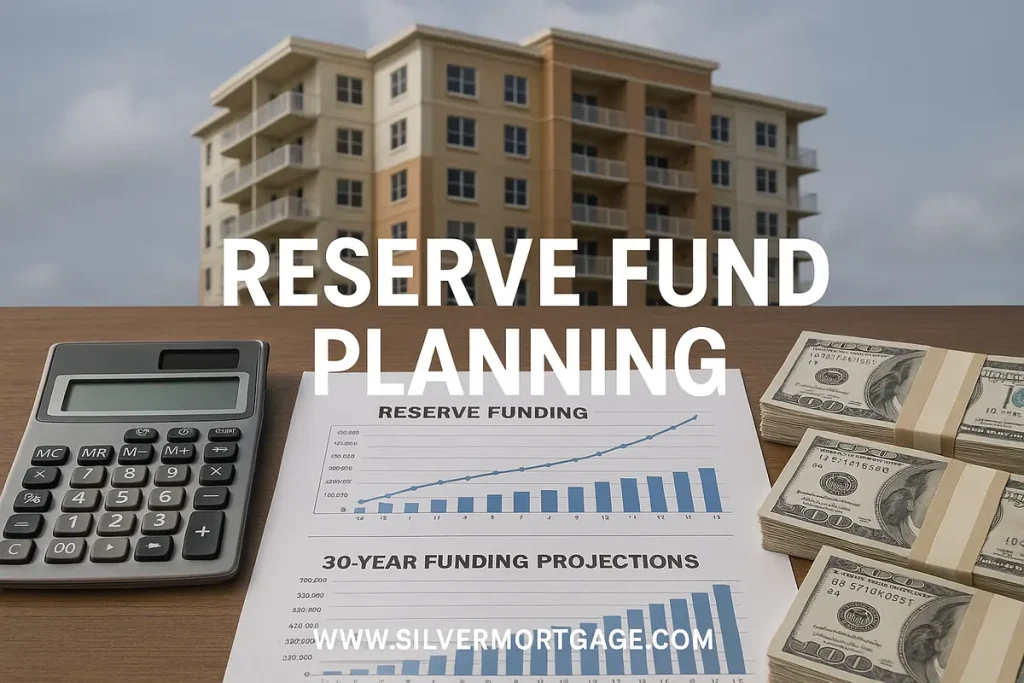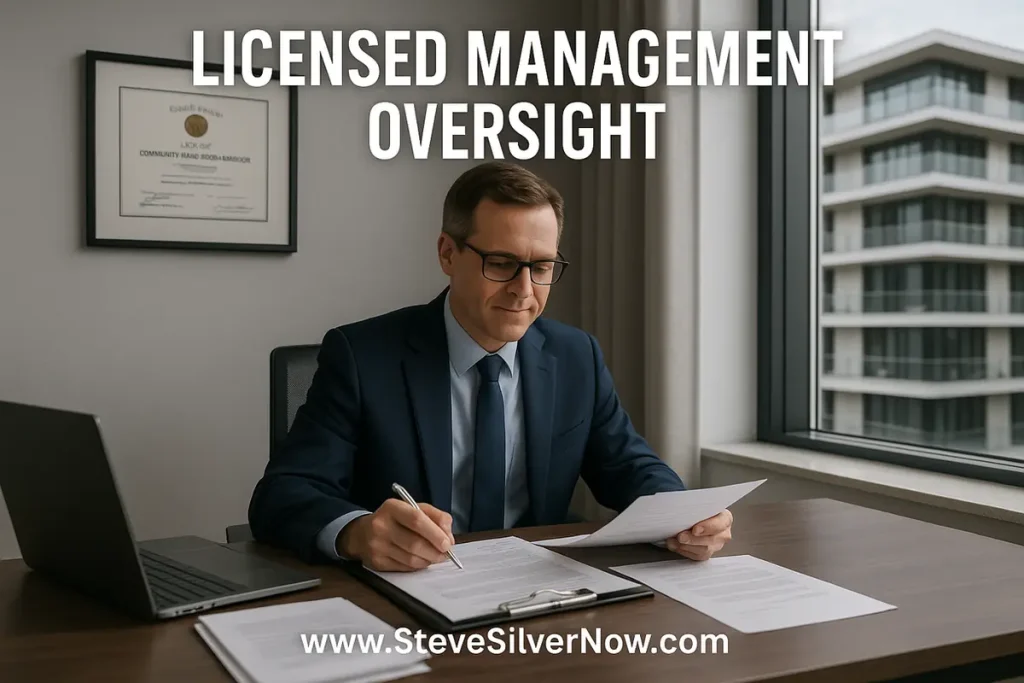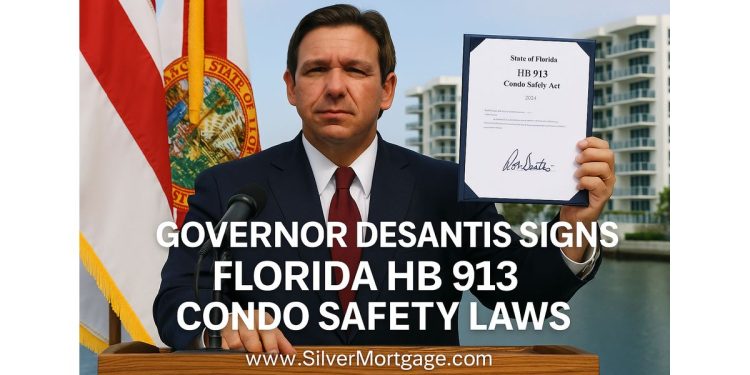Florida HB 913 Condo Law Changes 2025: Complete Buyer’s Guide to New Safety Requirements, Reserve Funding Rules, and What You Need to Know Before Buying, Selling, or Refinancing a Condominium
Quick Summary – What You Need to Know:
• New safety requirements: All buildings 3+ stories must complete structural inspections and reserve studies by December 31, 2025
• No more skipping reserves: Condominium owners can’t vote to skip funding for critical repairs like roofs and foundations
• Higher monthly fees likely: Better funding requirements may increase association dues but reduce surprise assessments
• Stricter management rules: All condo managers must be licensed, with criminal penalties for violations
• Better insurance protection: Buildings must carry full replacement cost insurance coverage
• More transparency: Buyers get access to inspection reports, reserve studies, and financial documents
• Flexible funding options: Associations can use loans or special assessments instead of just monthly contributions
Florida’s condominium landscape has been transformed by House Bill 913, a landmark piece of legislation that introduces significant changes to structural safety, reserve funding, and management oversight. These new regulations are a direct response to the Surfside tragedy and are designed to protect condo owners and buyers. If you’re considering buying a condo in Florida, understanding these changes is crucial for making an informed decision.
These regulatory changes affect condo buyers throughout Florida, from Miami and Fort Lauderdale to Tampa, Orlando, Jacksonville, and other major markets across the state.
This guide will break down the most critical aspects of the new law, helping you navigate the evolving condo market with confidence.
Key Changes You Need to Know
The 2025 condo law updates are the most significant overhaul of Florida’s condominium regulations in decades. They impact everything from how buildings are inspected to how associations manage their finances. For buyers, this means greater transparency and safety, but it can also result in higher ownership costs.
Enhanced Building Safety and Inspections

Safety is at the heart of HB 913. The law establishes strict protocols to address structural vulnerabilities, ensuring that buildings are adequately maintained and inspected.
Structural Integrity Reserve Study (SIRS) Requirements:
• Must be completed by December 31, 2025, for all buildings 3+ stories
• Covers critical components: roofs, foundations, load-bearing walls, waterproofing
• Creates a 30-year funding plan to prevent reserves from dropping below zero
• Must be updated after any major repairs are completed
• Small buildings with four units or fewer are completely exempt
Milestone Inspections:
• Required for buildings 30 years old (25 years if within 3 miles of the coast)
• Identifies significant structural issues and safety concerns
• Must be conducted by licensed engineers
• Results must be shared with all unit owners
Conflict of Interest Protections:
• Engineers must disclose if they plan to bid on repair work
• Family relationships between inspectors and contractors require disclosure
• Contracts can be voided if conflicts aren’t properly disclosed
• Professional license discipline applies to violations
New Rules for Reserve Funds and Budgeting

One of the most significant changes eliminates the practice of underfunding reserves that often led to extensive, unexpected special assessments.
No More Waiving Critical Reserves:
• Owners can’t vote to skip funding for essential structural items
• Applies to roofs, foundations, electrical systems, and waterproofing
• Ensures money is set aside for critical repairs
• Prevents deferred maintenance that can lead to disasters
Limited Exceptions to Reserve Requirements:
| Exception Type | Details |
| Building Termination | Buildings undergoing legal termination may waive reserves |
| Multi-Condo Associations | Those with approved alternative funding methods retain flexibility |
| Emergency Scenarios | Buildings declared uninhabitable allow temporary reserve reallocation |
| Post-Inspection Relief | Temporary pauses allowed after milestone inspections with majority approval |
Flexible Funding Options:
• Associations can use special assessments or loans instead of monthly contributions
• Requires approval from the majority of all unit owners (not just meeting attendees)
• Must equal the full amount that traditional reserves would have collected
• Funding must be immediately available when repairs are needed
Temporary Funding Relief:
• Associations can pause reserve contributions for up to 2 budget cycles
• Only available if the milestone inspection is completed within 2 years
• Allows redirecting funds to urgent repairs identified by inspectors
• Must resume regular contributions after the pause period ends
Reserve Pooling Benefits:
• Boards can combine funds for multiple components without owner votes
• Often reduces annual contributions through better cash flow management
• Structural reserves must be pooled separately from other components
• Can lower monthly assessments while maintaining adequate funding
Stronger Governance and Management Oversight

HB 913 introduces new measures to enhance the management and governance of condo associations, increasing accountability and protecting unit owners.
Criminal Penalties for Violations:
• Community association managers face misdemeanor charges for legal violations
• Up to 60 days imprisonment and $500 fines for knowing violations
• Creates a strong deterrent against unethical management practices
• Applies when managers knowingly perform illegal acts
Licensed Manager Requirements:
• All management contracts must verify active Florida licenses
• Boards must confirm license validity before signing agreements
• Contracts can be terminated immediately if licenses are suspended/revoked
• Gives owners confidence in management qualifications
Bad Actor Protections:
• Managers with revoked licenses are banned from the industry for 10 years
• Cannot work in or own management firms during the ban period
• Cannot reapply for licenses during prohibition
• Prevents unethical managers from operating behind company facades
Board Financial Responsibilities:
• Must use “best efforts to make prudent investment decisions”
• Applies to all association funds, including reserves and operating capital
• Can invest in CDs, money market accounts, and other secure instruments
• Helps associations earn interest while protecting principal amounts
Hurricane and Emergency Powers:
• Boards can require evacuation for any official evacuation order
• Includes voluntary and advisory orders, not just mandatory ones
• Enhanced authority for hurricane shutter maintenance responsibilities
• Clear rules about who pays for shutter removal and reinstallation
Updated Insurance Requirements
The new law strengthens insurance requirements to protect condo associations and their owners better.
Mandatory Insurance Enhancements:
| Requirement | Details |
| Coverage Type | Independent appraisals are required every 36 months |
| Coverage Amount | Must reflect full replacement cost, not depreciated values |
| Appraisal Schedule | Independent appraisals required every 36 months |
| Legal Override | State law overrides condo declarations that specify lower coverage |
| Benefit | Reduces special assessment risks after disasters |
What This Means for Buyers
Due Diligence Checklist:
• Request current SIRS reports and milestone inspection documents
• Review reserve funding methods and projected special assessments
• Verify community association manager licensing
• Examine insurance appraisals and coverage levels
• Check board meeting minutes for compliance patterns
• Understand potential hurricane shutter costs and responsibilities
Financial Considerations:
• Monthly association fees may be higher but more predictable
• Lower risk of surprise special assessments for major repairs
• Better protection of property values through proper maintenance
• Potential for alternative funding arrangements (loans vs. monthly fees)
Frequently Asked Questions
Why are people selling their Florida condos?
• New mandatory inspections and repairs are creating higher costs
• Some owners prefer to sell rather than pay for expensive renovations
• Increased supply of condos on the market due to these factors
Are Florida condo prices dropping?
• More condos for sale combined with higher ownership costs
• Buyers are being more cautious about building financial health
• Downward pressure on prices in some markets
How does HB 913 affect buying costs?
• Likely higher monthly association fees (calculate potential monthly payments)
• Increased transparency about future repair costs
• Better protection for your investment long-term
• More predictable expenses vs. surprise assessments
What should I look for when buying?
• Recent SIRS reports and milestone inspection results
• Building’s reserve funding status and methods
• Management company licensing and track record
• Board meeting minutes and compliance history
• Insurance coverage adequacy and appraisal dates
Key Deadlines and Requirements Table
| Requirement | Deadline | Applies To |
| SIRS Completion | December 31, 2025 | Buildings 3+ stories |
| Milestone Inspections | Ongoing | Buildings 30+ years old (25+ near coast) |
| Insurance Appraisals | Every 36 months | All associations |
| Manager License Verification | Before contract signing | All management agreements |
| Reserve Funding | Immediate | All eligible buildings (no more waivers) |
Summary
Florida’s HB 913 has fundamentally changed the condo buying landscape by prioritizing safety, financial responsibility, and transparency. While these changes may result in higher monthly fees and more complex due diligence, they also provide unprecedented protection for buyers and owners.
The law eliminates the practice of deferring critical maintenance that led to the Surfside tragedy, ensures proper reserve funding for significant repairs, and establishes strict oversight of management companies. For buyers, this means access to detailed inspection reports, reserve studies, and financial documents that were previously difficult to obtain.
Although the initial adjustment period may experience some market volatility, these reforms establish a more stable and secure foundation for Florida’s condominium market, ultimately safeguarding both individual investments and resident safety for years to come.
Legal Disclaimer
Important Notice: This article is for informational purposes only and does not constitute legal advice.
The information contained in this guide is based on publicly available information about Florida House Bill 913 and is intended to provide general educational content about condominium law changes. This content should not be relied upon as legal advice for any specific situation.
About Steve Silver, Licensed Mortgage Professional
Steve Silver has been helping clients in Houston, Dallas, Austin, Tampa Bay, Orlando, Miami, and Colorado mountain communities secure mortgages for over 40 years.
At Silver Mortgage, we’re a Privacy-Focused Mortgage Company.
*Content provided for information purposes only and not guaranteed to be accurate at the time you are reading this article.

Ready to get started?
• Call: 1-800-920-5720 or 281-362-8886 Text: 719-626-1466 E-Mail: info@SilverMortgage.com
• Free pre-qualification: Mortgage Calculator and Online Application
• Privacy-focused mortgage quotes: Available in TX, FL, and CO (New Mexico 4th Qtr 2025)
Licensed in: Texas (NMLS #314817, #360472, #70160) | Florida (NMLS #LO91968) | Colorado (NMLS #100538170)




























